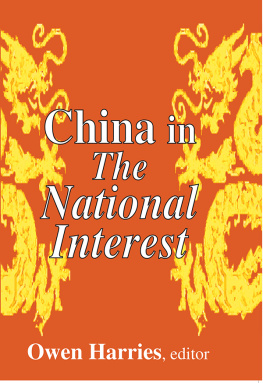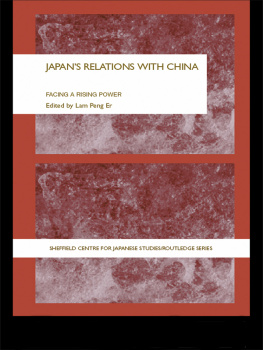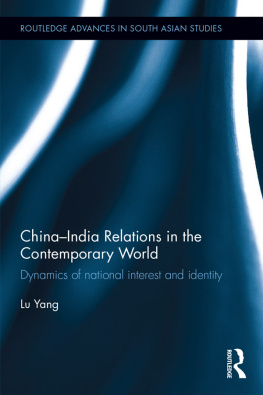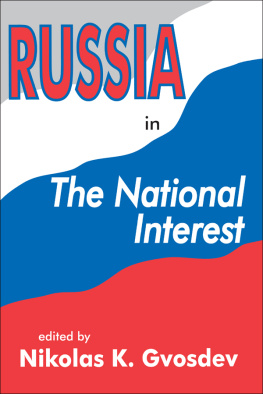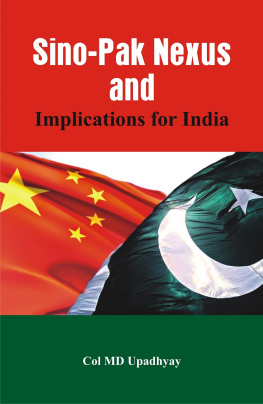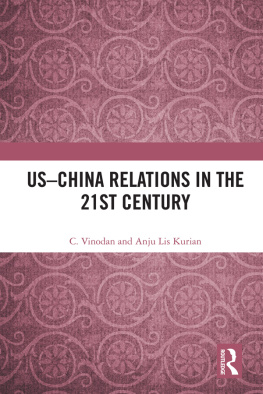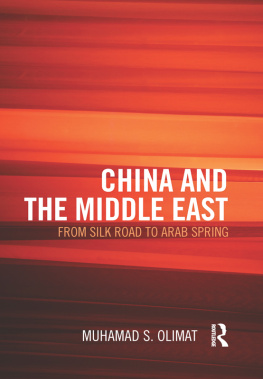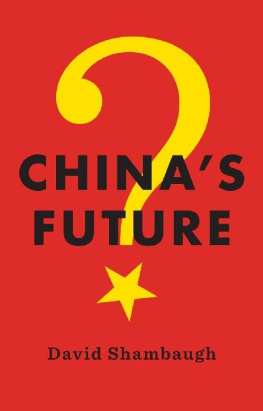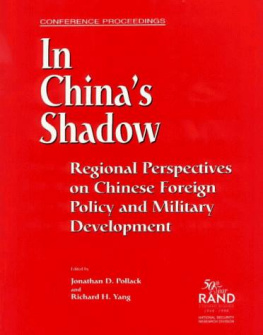Originally published in The National Interest
Published 2003 by Transaction Publishers
Published 2017 by Routledge
2 Park Square, Milton Park, Abingdon, Oxon OX14 4RN
711 Third Avenue, New York, NY 10017, USA
Routledge is an imprint of the Taylor & Francis Group, an informa business
New material this edition Copyright 2003 by Taylor & Francis.
All rights reserved. No part of this book may be reprinted or reproduced or utilised in any form or by any electronic, mechanical, or other means, now known or hereafter invented, including photocopying and recording, or in any information storage or retrieval system, without permission in writing from the publishers.
Notice:
Product or corporate names may be trademarks or registered trademarks, and are used only for identification and explanation without intent to infringe.
Library of Congress Catalog Number: 2002029106
China in the National interest / Owen Harries, editor.
p. cm.
ISBN 0-7658-0561-8 (alk. paper)
I. ChinaPolitics and government1976- 2. ChinaSocial conditions 1976- 3. ChinaEconomic conditions1976-2000. I. Harries, Owen.
II. National interest.
DS779.26 .C473517 2002
951.05dc21
2002029106
ISBN 13: 978-0-7658-0561-4 (pbk)
ISBN 13: 978-0-7658-0157-9 (hbk)
Contents
Zbigniew Brzezinski
Paul Wolfowitz
Rajan Menon and S. Enders Wimbush
Robert B. Zoellick
Robert S. Ross
Thomas J. Christensen and Richard K. Betts
Bruce Cumings
Charles Homer
David M. Lampton
Henry S. Rowen
George T. Crane
David Zweig
Bruce J. Dickson
Nathan Glazer
Grace Goodell
John Fitzgerald
Robert M. Pease
Nicholas Eberstadt
Robert Elegant
Robert S. Ross
Bates Gill and Michael OHanlon
James Lilley and Carl Ford
Bates Gill and Michael OHanlon
A.D. McLennan
George Walden
Charles Homer
Ross Terrill
Richard L. Walker
Introduction
During the first years of The National Interests life, the foreign country that occupied most of the magazines attention was the Soviet Union, initially as a still formidable rival and then as a superpower engaged in a spectacular process of self-destruction. Then for a brief period it was Japan that held center stage. But even as it was being described as an unstoppable juggernaut, Japans economy stalled and it became evident that the country lacked the assertive will and confidence to become a full-blown world power.
From the mid-1990s on there has been near universal agreement that the main contender for the world heavy weight title, currently firmly in the hands of the United States, is going to be China. This has been reflected in the pages of The National Interest. Between 1995 and 2001, the magazine published no fewer than 28 articles dealing with some aspect of that country, and it is a significant subset of these essays that now make up this volume.
Collectively, they present a picture of that country in the round: not only of its place in the international system and its interaction with the United Statesthough these aspects are dealt with in depthbut also Chinas history, its culture, its society and economy, its polity and military. Written by leading scholars, analysts and policymakers, these articles certainly reflect the prevailing consensus concerning the looming importance of China. But just as certainly they also serve to remind usby what they say about past American attitudes and assumptions, by the currently prevailing views they feel obliged to contest, and not least by their frequent sharp differences with each otherthat China has been and is a particularly difficult subject for Americans. It arouses strong and conflicting emotions, and creates deep divisions concerning high policy.
Robert Zoellick reminds us that Americas dealings with China reflect two strong and conflicting traditions, one stemming from an extended missionary experience and one representing a realist concept of interest and power. The result of this conflict, he argues, has been a pendulum swing of alternating attitudes, now romanticizing now demonizing China. Bruce Cummings observes merely that To say China is instantly to call up a string of metaphors giving us the history of Sino-American relations, and he proceeds to rattle off a list of very diverse examples ranging from boxes within boxes, to open door, to the good earth, to sick man, to little red book, to Ping-Pong, to playing card, to butcherand so on and on.
Zoellicks image of a swinging pendulum is if anything too sedate to convey the erratic and violent swings of the American attitude. Many of those Americans who insisted on treating China as a paragon and model during the hideous years of the Cultural Revolution are now its most severe critics on human rights, despite the fact that its performance concerning those rights, though still bad, has improved enormously in the meantime. Conversely, in the 1970s American leaders who for years had insisted on treating China as a pariah suddenly decided to cozy up and deal with it, and did so at a time when that countrys internal affairs were about as bad as they could be. Circumstancesones that as often as not have little to do with what is happening in China itself and a great deal to do with what is happening in the rest of the world, and the internal politics and prevailing moods of the United Sateshave certainly altered cases dramatically in Sino-U.S. relations.
Another aspect of American dealings with China that suggests a degree of confusion and emotionalism is the tendency, both exhibited and discussed in these pages, to demand of the Chinese a standard of behavior that the United states itself does not meet. This has been especially evident in recent years, when the United States has complained bitterly of Chinese espionage while engaging in widespread espionage itself, including most egregiously and incompetently the bugging of the Chinese presidents aircraft; and when outrage has been expressed at Chinese interference in the American electoral process, something that the United states has long practiced with respect to other countries. It is most notable of all in complaints about Chinas military build-up, at a time when the United States outspends the rest of the world combined; and about the iniquity of Chinas arms sales to other countries at a time when the United States itself is the worlds main exporter of arms. As Robert Ross says in these pages:
No moral equivalence is intended or required. But the United States should avoid the conceit that a given mode of behaviour can be wrong for every country in the world but still right for the United States because of the purity of its motives. Obviously, when other countries develop similar policies to pursue similar objectives, interest rather than morality is the appropriate standard of judgment.

